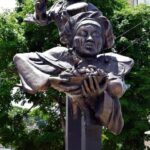National Archives reveals history of Yoruba Village in East Port of Spain, Trinidad and Tobago
National Archives of Trinidad and Tobago informed the general public about the Yoruba/Yarraba Village in the East of Port of Spain.
4th of August 2023

Port of Spain, Trinidad and Tobago: The National Archives of Trinidad and Tobago informed the general public about the Yoruba/Yarraba Village in the East of Port of Spain.
Covering areas in East Dry River, Belmont (then Freetown), Laventille, and Morvant, the Yoruba Village was home to many free Yoruba people who arrived in Trinidad in the post-Emancipation era, according to the update shared by National Archives.
Today, there is a sign at the entrance of East Dry River that pays tribute to the rich history. It read, “For many years during the 19th century, a part of East Port of Spain was known as Yarraba Village or Yarraba Town.” This was so because of the large population of Yarraba-speaking people who were to be found in this section of the City of Port of Spain.
It further informed that the Yarraba people, or Free Africans, had come originally from the West Coast of Africa. Taken by slave traders from their homes, they were liberated at sea by the British Navy in the period after 1838, which operated a blockade against the slave trade. They were brought to Trinidad, where they landed as free people. They formed societies for their protection and well-being and maintained most of their important elements.
The pioneer of their family in Trinidad was Acojori Zahwru, who adopted the French name of Robert Antoine upon his arrival to Trinidad in 1855. He was born in Dahomey in 1800 and was among the last group of African immigrants to come to Trinidad.
National Archives also added that while other groups like the Rada and Kongo people also settled in the East Port of Spain, the Yorubas in the East Dry River were one of the last large groups of Africans to settle in Trinidad in the 19th century. With their arrival, they brought their beliefs, language, and traditions, thus reinforcing the strong influence of West African culture and heritage in our society.
Among the traditions retained and passed on by the Yoruba people are drumming and the Orisha/Orisa religion. Scholars have also cited the influence of the Yoruba in our Carnival and calypso art forms, as well as in our language.
The organisation also showed a photo which showed the Yoruba Village Monument that was unveiled this year by the Emancipation Support Committee (ESC) in tribute to the Yoruba Village Community and its rich heritage. It is part of the National Archives of Trinidad and Tobago Photo Collection.
Latest
- National School Meals Programme rejects claims of substandard vegetarian meal in Antigua and Barbuda
-
LIAT Air Expands Caribbean Network with New Routes to Antigua and Montego Bay -
US withdraws advisory on St. Kitts and Nevis, gives green flag to its Citizenship Programme -
CARIFTA Games 2026 set to take place in Grenada from April 4-6 -
West Indies Women’s Cricket team announced for T20 series against Sri Lanka in Grenada
Related Articles

1st of December 2024

29th of November 2024

29th of November 2024

22nd of November 2024

27th of November 2024

22nd of November 2024


19th of November 2024

